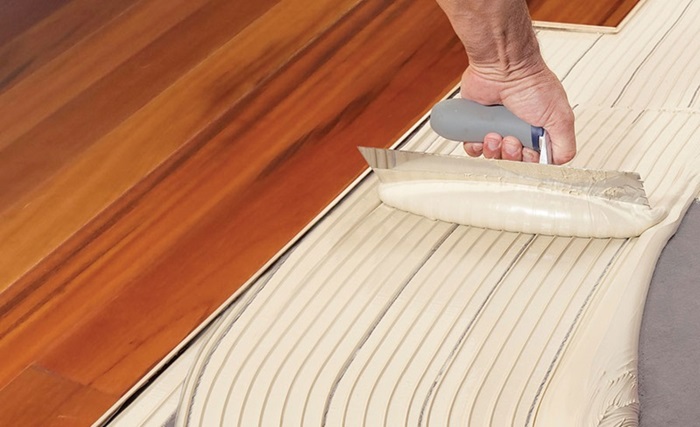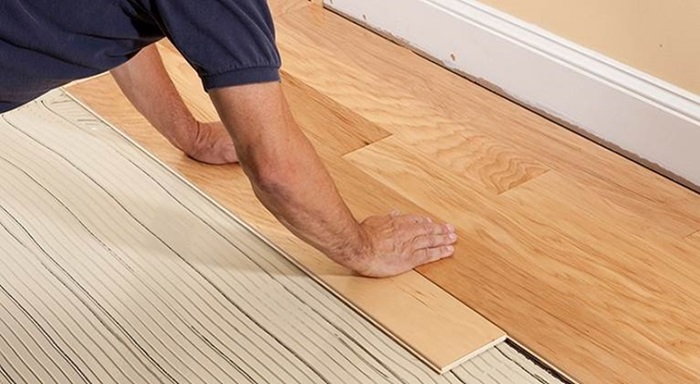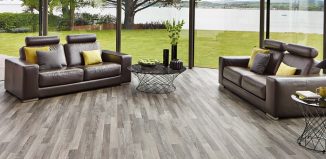When designing and renovating your home, one of the most critical decisions is choosing the right flooring. Your choice won’t just affect the way your house looks, but also your comfort and functionality as well as the duration of the floors. The flooring is the largest surface of your home and picking the right type can be hard and sometimes expensive, but when you choose the one suited for your home, it will make all the difference. Amidst the multitude of options available, there’s one that has taken the flooring world by storm lately and that’s vinyl.
Vinyl Flooring

There are particular reasons why this specific option is becoming popular and that’s because it can stand up to tough messes, it’s economical, and easy to clean. But before we go over its characteristics, let’s see the types of vinyl flooring.
Types
There are several types of vinyl:
- Luxury Vinyl Planks (LVP) are made of limestone-based mineral material mixed with PVC composites with a design layer that gives it the look of an authentic hardwood floor and is more rigid than sheet vinyl or vinyl tiles which makes them more durable and scratch-resistant, and the perfect flooring adhesive will ensure that your floor is looking immaculate.
- Luxury Vinyl Tile (LVT) is constructed very similarly to LVP, but unlike the LVP which is designed to look like hardwood, LVT is designed to look more like stone, porcelain or ceramic tile. It is also rigid, which makes it more durable.
- Sheet Vinyl is a much softer material than the previously mentioned two, which makes it less scratch-resistant. It mimics the look of wood and stone but it’s much cheaper than wood and stone.
Advantages of Vinyl Flooring
Each flooring type has its advantages and disadvantages, including vinyl flooring, so let’s go over some of its characteristics and properties.
Durability
If there’s one thing that makes this type of flooring stand out it’s its durability. Vinyl floors are more durable, and resistant to cracks, dents or breaks because of their composition. And if you choose the planking system, you don’t have to worry about replacing your whole floor if it’s damaged, because you can replace that one damaged plank.
Waterproof
Another great thing about these floors is that they are waterproof, which makes them perfect for bathrooms and kitchens and even for the whole house if you have children or pets, or both, because you don’t have to worry about spills – simply wipe it and move on with your day.
Affordable
If you’re renovating your whole living space, finding materials that are good and inexpensive is hard, and this is where vinyl comes in handy. Not only is it durable, but compared to wood, stone and ceramics it’s much less expensive, meaning you will get flooring that is both affordable and will last for a long period.
Installation Methods

Vinyl is one of the easiest floors to install. Of course, it depends on the type of vinyl, but the process is pretty straightforward. There are three common methods of this process which are:
- Floating – this process doesn’t require adhesive, because the planks and tiles have an interlocking system.
- Full spread method – this method requires you to apply adhesive all over the floor before the installation.
- Peel and Stick method – with this option, you peel off a layer on the back of each plank so that the adhesive part is revealed before you put it in its place.
Before any of these methods, you need to make sure that the surface you’re applying this flooring is clean and smooth so that there aren’t any bumps and noticeable high spots.
How to Clean Vinyl?
Even though vinyl flooring is very durable and water-resistant, cleaning it and maintaining it properly will ensure the longevity of your floor. Sweeping or vacuuming regularly will prevent dust build-up, dirt and hair. Then move on with mopping. One of the best cleaners for vinyl is apple cider vinegar. Simply mix it with water and use a damp mop to clean it. If your floor has other stains, and you need to rub those stains to go away, do it gently so that you don’t scratch the surface. Although these floors are very scratch-resistant, you still need to be careful when cleaning them.
Flooring Adhesive
If the vinyl flooring you’ve picked requires the full spread method to install, there’s one thing you will need and that is the appropriate adhesive.
What Is Flooring Adhesive?
It is a specialised adhesive used in the installation of flooring. It is designed to create a strong bond between the floor, in this case, the vinyl, and the subfloor, ensuring a stable and long-lasting installation of your floor.
Why Is It Important?
Using a quality floor tile adhesive for your vinyl floors will make the process of installation quicker and it will also make sure that your floor lasts longer, looks better and saves you the headache of replacing it in a few years.
There are different types of adhesives designed to work with different types of flooring, to ensure their stability. When talking about stability, the adhesive also enhances the stability of the whole flooring which means that it limits the movement underfoot and that the floor stays in place. Some vinyl flooring adhesives offer moisture resistance, which is important especially if you use vinyl flooring in places prone to dampness such as bathrooms.
How To Install Flooring Adhesive?
The process of installing adhesive is important, because the better you do it, the longer the floor is going to last. Before you apply the adhesive you need to prepare the subfloor and make sure it is clean, dry and level. If there are any bumps you can sand them. If your subfloor is well-prepared the process will go smoothly.
Then, spread the adhesive.
Spread it evenly and work in small sections to prevent it from drying before you lay down the vinyl. How long does it take for flooring adhesive to dry? It depends on the type of adhesive and the humidity in the room, however, it is recommended to wait around 24 hours before you lay any heavy furniture on the floor.
Choosing and installing vinyl flooring is a transformative process that will elevate the aesthetic and functionality of your home. Picking the right adhesives, proper preparation and the correct methods of installation are essential steps for successful vinyl flooring, no matter which type of vinyl you choose.












